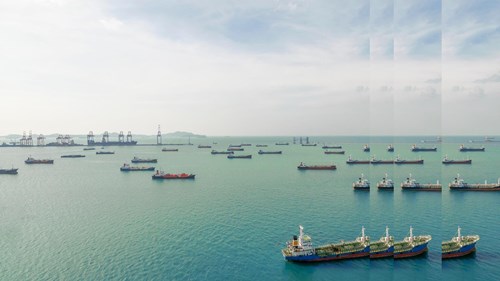Next step following implementation of the First German Sanctions Enforcement Act: draft bill for a Second German Sanctions Enforcement Act submitted
On 28 May of this year, the First German Sanctions Enforcement Act (erstes Sanktionsdurchsetzungsgesetz - SDG I) entered into force. The new legislation was designed to allow for broader powers to investigate and to freeze assets when enforcing the EU’s sanctions against Russia in practice and to facilitate the exchange of information between different authorities. The German Federal Ministry of Finance has now jointly put forward a draft bill for the Second German Sanctions Enforcement Act (zweites Sanktionsdurchsetzungsgesetz - SDG II) together with the Federal Ministry for Economic Affairs and Climate Action. The bill aims to bring structural improvements when enforcing sanctions and fighting money laundering in Germany.
I. Design of the new act
The Second German Sanctions Enforcement Act is an omnibus act which on the one hand serves to modify a range of different German acts, including the Foreign Trade and Payments Act, Anti-Money Laundering Act, Banking Act and Securities Trading Act. At the same time, the act contains the draft of a new Sanctions Enforcement Act (Sanktionsdurchsetzungsgesetz - SanktDG-E) which is to be introduced. This new Act is to contain the main provisions regarding the new central authority (more on this below).
1. Creating a central authority responsible for enforcing national sanctions at federal level
The creation of this responsibility for exercising the investigative powers under section 9a onwards of the German Foreign Trade and Payments Act (Außenwirtschaftsgesetz - AWG) (see in particular section 1 Sanctions Enforcement Act – SanktDG-E) at federal level is the key element of the draft act. Considering how responsibilities are currently split up between diverse authorities at the level of the individual states, this is the only way to ensure that measures are coordinated and enforced uniformly throughout the country. Leaving the responsibilities of the Federal Office for Economics and Export Control or the Bundesbank (the German central bank) unaffected, this new central authority is to be subordinated to the Federal Ministry of Finance in order to achieve synergy effects between the enforcement of sanctions and the fight against money laundering. For reasons of efficiency, the unit will initially be affiliated to the Central Customs Authority, an existing authority. Over the course of time, the plan is that it will be transferred to a newly established higher federal authority responsible for combatting financial crime.
2. Reporting requirement and creation of an administrative procedure for investigating assets of sanctioned persons
The reporting requirement in section 23a Foreign Trade and Payments Act introduced as a result of the First German Sanctions Enforcement Act is modified by section 10 of the draft Sanctions Enforcement Act. Only sanctioned persons themselves are required to report, and no longer logistics providers. Sections 11 and 12 of the draft Sanctions Enforcement Act provide for the possibility of administrative procedures to identify domestically located funds or economic resources owned or controlled by listed persons or to identify owners or beneficial owners of known domestic assets. According to section 14 of the draft Sanctions Enforcement Act, in this case a register will be set up containing details of sanctioned persons and assets controlled by these persons. Information about such assets is also to be included where there are doubts about ownership or beneficial ownership. This register will be publicly accessible on the central authority’s website.
3. Setting up a whistleblowing agency
Based on the model of the EU whistleblowing unit, a unit responsible for receiving tip-offs by whistleblowers is to be set up at the new Central Authority for Sanctions Enforcement (Zentralstelle für Sanktionsdurchsetzung) (section 15 of the draft Sanctions Enforcement Act). It will be responsible for receiving tips from Germany or abroad on sanctions-related matters, checking their validity and initiating any measures to investigate the matter.
4. Possibility to appoint a special representative to monitor compliance with sanctions in companies
If a legal entity or partnership breaches prohibitions on providing or transferring funds or if there are indications that it may breach them, the central authority will have the possibility to appoint a special representative (monitor) to supervise compliance with sanctions (section 9 draft Sanctions Enforcement Act).
5. Transparency reports by notaries
When legal transactions involving the incorporation of associations or legal structures subject to transparency requirements or amendments to such associations or structures are performed, it will no longer be the parties themselves who have to file the reports to the Transparency Register in the future, but notaries (see the new section 19c Anti-Money Laundering Act).
6. Real estate data linked to the Transparency Register
In order to bridge the time until the joint land register database of the German states is up and running and to provide authorities and other parties subject to requirements with the possibility to assess the risks and inform themselves about which association is registered in which of the approximately 530 land registers in Germany, information on real estate owned by legal entities or partnerships will be accessible through the Transparency Register. This is also intended to make company histories much easier to follow in the event of corporate changes.
7. Requirement of foreign organisations to file notifications regarding existing real property in Germany as well
Foreign companies holding existing real estate are now also required to file notifications to the Transparency Register, not just when acquiring new properties.
8. Introduction of a ban on cash purchases in real estate transactions
Section 16a of the German Anti-Money Laundering Act (Geldwäschegesetz - GwG) states that the consideration due when acquiring real estate can only be remitted by means other than cash, cryptocurrencies or commodities. By incorporating this provision, the German government has implemented its mission to introduce a ban on cash payments in real estate transactions within the framework of the Money Laundering Act, which was one of its main priorities.
9. Increased transparency for the concept of the deemed beneficial owner pursuant to section 3(2), fifth sentence German Anti-Money Laundering Act
In the future, legal entities subject to notification requirements will have to justify why they are making use of the concept of the deemed beneficial owner. They will have to state that either (1) no individual meets the requirements for a beneficial owner (“diversified holdings”) or (2) that the beneficial owner cannot be identified. This is intended to avoid circumvention tactics and to enable the party subject to notification requirements to act in line with the risks in the more suspicious second case group.
10. Making ownership and control structure overviews useable for authorities
The Second German Sanctions Enforcement Act is intended to make the overviews showing ownership and control structures that are prepared by the Transparency Register during the procedure for reviewing discrepancy reports under section 23(3a) German Anti-Money Laundering Act usable for authorities and parties subject to reporting requirements.
11. Declarations regarding UN listings to be immediately applicable
To avoid time gaps in the implementation of new listings by the United Nations, the Second German Sanctions Enforcement Act will declare them to be automatically applicable in Germany.
12. Adjustment of rules regarding trustworthiness in the financial supervisory legislation
In the future, a presumption of untrustworthiness is to apply to individuals, legal entities and partnerships that are themselves included in a EU sanctions list. Different rules will apply to persons acting on behalf of sanctioned parties or representing their interests. Such persons are to be considered untrustworthy only as a general rule, but it will be possible for them to clear themselves of this presumption. This provision is intended to reflect the typical dangers posed by sanctions and is therefore structured in a similar way to strict liability, which applies regardless of fault.
II. Outlook
Besides the measures provided in the draft act, other measures are also planned, including linking the registers on the assets of sanctioned persons to other registers, setting up and rolling out a new real estate transactions database in which information from notarisations of real estate transactions will be saved and other measures designed to prevent concealment of assets and to combat money laundering.
Well
informed
Subscribe to our newsletter now to stay up to date on the latest developments.
Subscribe now










